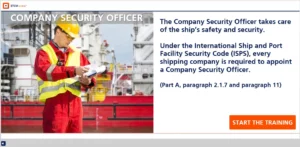
How it works
1. Sign up
Go digital and save time. Simply sign up and you can start the course immediately.
2. Take the course
You will need a PC, laptop, tablet or smartphone (iOS or Android). You can take the course online or download the course.
3. Assessment
The Assessment consists of multiple-choice questions. Upon successful completion of the assesment you will receive your certificate.
4. Certificate
You will receive a download link for your certificate. You are free to (re)print your certificate anytime. A signed and stamped original hard-copy by mail can be ordered.
FAQ
The CSO online course trains personnel to develop, implement, and supervise Ship Security Plans. It is aligned with IMO Model Course 3.20 and provides essential skills for identifying threats and conducting risk assessments.
After completing the course and passing the assessment, you will receive a downloadable signed and stamped certificate approved by EC-MT, the Netherlands. You can request a hard copy if needed.
The course covers maritime security policies, ship security plans, threat identification, and emergency preparedness. It includes topics such as security equipment, drills and assessments. The course concludes with a multiple-choice assessment. It follows the IMO Model Course 3.20 and covers the STCW requirements for Company Security Officers, ensuring compliance with international maritime security standards.
The CSO training online takes approximately three hours to complete, but this may vary based on English proficiency and individual study pace.
Yes, the course is completely online, so you can take it anytime, anywhere.
The course is priced at €109 EUR or $109 USD, with the option to purchase a hard copy of your certificate for an additional fee.
This course is designed for personnel involved in maritime security matters, including those from shipping companies, Designated Persons Ashore, Company Security Officers, Quality Managers, Operations Managers, Superintendents, and Internal Auditors. It is essential for anyone responsible for ensuring ship security compliance and managing security protocols.
After passing the assessment, you will receive a download link for your signed and stamped certificate approved by ECMT (Emergency Control and Maritime Training)
You are free to (re)print your certificate anytime. An original hard-copy by mail can be ordered (not included)











